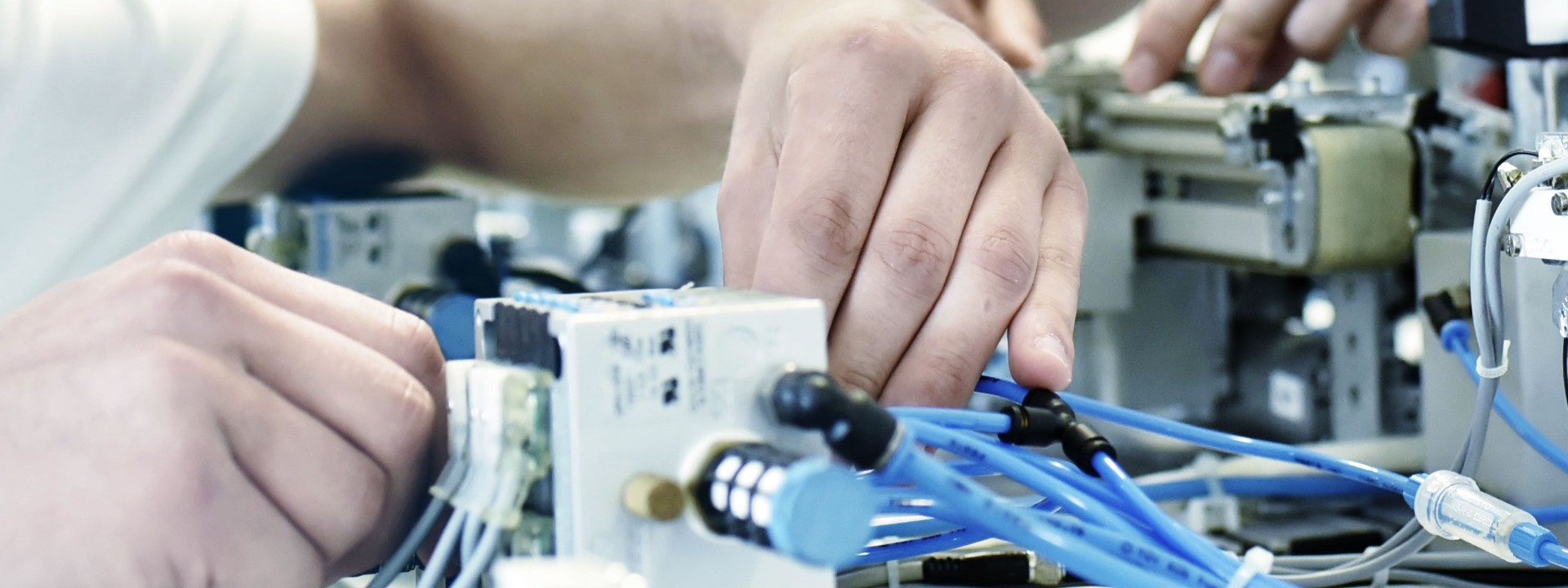TVET Services: Putting Theory into Practice – First-Hand Knowledge Transfer
We don’t only provide support in your planning process but also in the practical operation of training programs or facilities.
What you can expect in the area of implementation and operations:
- The full-service package: We take on the entire operation of the training center up to the delivery of all technical and non-technical programs – including providing trainers and programs as well as school management and maintenance.
- The modular solution: We focus on the running of vocational and academic programs for training centers in public or private ownership.
The full-service package: Operating the training facility
A professional school administration and management system is needed to operate a training facility. This system is based on the management structures of our global teaching institutions and is adapted to the local situation.
Reference
Learning only from the best – The recruitment process for trainers
To ensure that the technical programs are implemented according to the proven dual qualification criteria, we mobilize a team of technical experts who are able to both train the trainers and conduct trainings with the participants.
All of our trainers are selected based on their professional training experience and their technical expertise. New employees undergo a competence assessment with a focus on their technical and pedagogical expertise, as well as their industry experience.
Design of TVET programs
Digital transformation and technological dynamics place growing demands on the proper operation of equipment, machines, and means of transportation, proper maintenance and inspection as well as the control and analysis of processes and infrastructures. At the same time it is important to ensure that new technologies and the increase in interconnectivity do not present a danger to the safety of people or the environment. This demands a very specific technological know-how and the capacity to practically apply knowledge.
TÜV Rheinland is one of the leading competency companions for technical vocations. For 140 years, we have been engaged in the highly charged topic of human and environmental safety in the field of technology, industry and progress. From this exceptional combination, we develop training programs that approximate modern industrial requirements and certification programs and are recognized across sectors. The close integration with industry incorporates a deep understanding of the practical relevance into our curricula, which ensures timely topical content and corresponds to the current state of technological progress.
Implementation of TVET Programs
The implementation of the training programs, which we have either tailor made beforehand or which are based on an existing curriculum, belong to our core competence.
The duration of qualification programs varies: In addition to three-year-long vocational training programs, we also offer short-term qualification courses of different types, which meet the needs of companies, industry sectors or public institutions seeking opportunities for lifelong continuous learning for their people.
We conduct practical skills development programs in a variety of technical disciplines, including
- Electrical and Mechanical Engineering
- Mechatronics
- Automation
- Industry 4.0
- Automotive Maintenance
- New Energy Vehicles
- Welding
- CNC
- and many more.
Reference
Keep pace with progress of technology
Our awareness of the necessary skills and skill levels for a specific job, activity or role help us tailor qualification offerings. This enables you as a company to adapt to changes in processes, customer requirements or product lines and to drive development of new professional competences in a targeted manner. As a training provider, you become more attractive for industry as your learners offer a higher level of industry-related skills.
Our products vary around the world from a range of modular and concise qualification programs to vocational training programs running for several years.
Based on the German example of a dual, skills-based vocational training, we focus on the practical side of vocational training and competence development in all training programs, in addition to imparting technical knowledge. Depending on the program scope, the training concludes with either a certificate or a fully accredited professional qualification.
We have already advised many organizations on how to modernize and successfully implement their vocational education and training, for example in the automotive industry and other typical manufacturing companies, as well as in the oil and gas industry, the energy sector and the construction sector.
When can we work for you?
Curriculum development and revision
Modern curricula in accordance with industry requirements are at the heart of a successful vocational training and continuing education program. Whether in the field of electro technology, mechatronics and automation, machining, welding, pipeline construction or the motor vehicle sector. TÜV Rheinland is familiar with all of these technical disciplines and experienced in the enhancement of curricula.
For public training facilities, local schools, and technical colleges not reliant on TÜV Rheinland curricula, we develop new curricula or modernize existing curricula – a task that is one of our core competencies.
We are guided by proven framework curricula, principles and methods which correspond to the requirements of the German dual vocational training system. For development and adaptation, we always take the following points into account:
- What are the goals of the training?
- Which contents are up-to-date, necessary and meet industry requirements?
- What methods need to be taught?
- Under what conditions can the content be taught?
- What does the organization require? Are the facilities appropriate for the new training materials?
- How are the learning outcomes determined and how can they be objectively assessed?
Application of knowledge is always at the forefront of every curriculum update. We use methods and didactics for skills-based training to ensure that learning performance is optimally aligned to industry requirements.

In this process, we place great value on orienting curricula to German standards, and yet remaining flexible enough to be able to properly address the local needs and requirements of the specific training facility.
When can we work for you?


